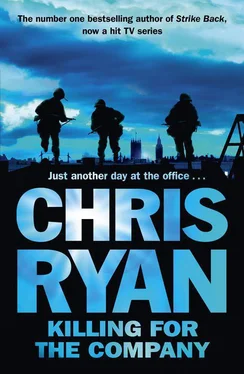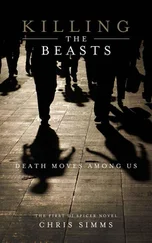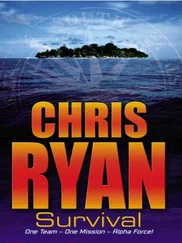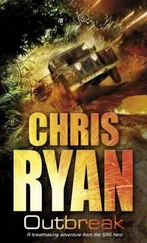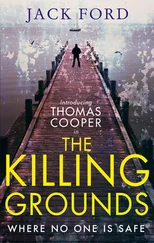‘Don’t worry about it, boss,’ Fozzie said quietly. ‘He’ll be safe as houses.’
Yeah, Luke thought to himself. Safe as houses. Only houses weren’t that safe on the Gaza Strip.
He continued to examine the map as his unit stood around him in silence, doing the same.
Now that the whole squadron was in camp, there was a new bustle around Credenhill. There was plenty to do in advance of the op. Each man needed to test-fire and zero his personal weapons, while the SQMS checked that all the squadron assets were available and ready to go, in advance of the hardware being bagged up for transit. There were further squadron briefings in one lecture room or another, and in between times the men went about the business of selecting their own personal gear, suitable for the operation and the theatre in which they might find themselves. Luke and the unit rejected their digital camo in favour of civvies: once they hit Gaza, they didn’t want to look military, as there was nothing like the sight of a foreign soldier to provoke unrest. But he’d be wearing his body armour underneath — he’d definitely want that if things went noisy.
Later in the afternoon the squadron OC and sergeant major left camp, part of an advance party heading out to meet with Israeli liaison officers on the ground, while Luke and his men continued to study the imagery of their route in and out of Gaza City. They’d have GPS on the ground, and the ops room would have a handle on their location at all times, but all that wasn’t a substitute for a working knowledge of the terrain.
The rest of the day passed quickly. At 19.30 Luke got some scran with Finn just as O’Donoghue walked into the sergeants’ mess to tell them that there would be a further briefing the following morning at 07.00. ‘Royal Protection Squad,’ he said curtly. ‘Stratton’s usual team when they’re in the UK. Do me a kindness, fellas: shake their hands and smile sweetly.’ They all understood what he was saying. The Royal Protection boys were trained up by the SAS in the first place. There wasn’t much they could tell Luke and his unit about the ins and outs of acting as a counter-attack team. But the unit would press the flesh with Stratton’s usual point men.
Once O’Donoghue had left, the men started wolfing down their plates of thick stew and heavy dumplings. ‘If you ask me,’ Finn muttered, ‘Stratton would look a whole lot better with a Palestinian round in his cerebral cortex. Fucker’s got a cheek asking for a Regiment guard in the Middle East after everything he’s done.’
‘Get used to it, buddy,’ said Luke. ‘Did no one ever tell you we’re not here to play politics — just to help the dickheads who do?’
Finn grunted. He hadn’t changed much over the years. He was still a shoot first, ask questions later kind of operator. What had changed was his relationship with Luke. Their first op together in Iraq had been tense, and Finn hadn’t liked following Luke’s lead. They were closer now. They’d fought alongside each other for years. It had created a bond.
Tomorrow promised to be another long day, so when he’d finished eating, Luke headed off to the single-bunk room where he kept all his gear and slept when he was staying in base. He was beat and looking forward to getting his head down, so he shut the door behind him, laid down on his bunk and — despite the sound in the corridor outside of his more boisterous colleagues — he was asleep within minutes.
And as Luke slept, he dreamed.
His dreams were vivid. He dreamed of flashing blue lights and the gnarled wreckage of a train. He dreamed of Alistair Stratton, a man he had never met but whose thin face was very familiar. A voice spoke in his head. Stratton’s all right.
Suddenly Luke saw himself sitting in a scummy bar in the arse end of Serbia. He knew just how to reply. He was reliving a conversation that had already happened, after all. Stratton is a politician. Therefore Stratton is a wanker. End of. He turned his head to look at his companion, fully expecting to see Chet as he was back then.
But he saw nothing of the sort. The figure sitting at the table next to him was unrecognisable. His hair had burned away; the skin of his face was charred and suppurating; his clothes were rags, sticking to him in places and non-existent in others.
He didn’t know what it was that woke him. The horror of that vision, or the sound of his mobile phone. Luke sat bolt upright in his bed, his skin damp with sweat, and for a moment he wondered where he was. It was the smell that told him he was in camp: the antiseptic, institutional aroma tinged with a hint of cordite. The noises from outside had stopped and the only light in the room came from the phone glowing through the pocket of the trousers that he’d dumped on the floor by the bunk. He squinted at his chunky watch, its hands and face still vaguely luminous. Quarter to twelve. Who the fuck was calling him at this time of night?
Luke hauled his arse out of bed and fumbled in the darkness, pulling his phone from his pocket and shielding his eyes slightly from the brightness of its screen. The phone continued to vibrate in his hand as he looked down to check the caller’s number.
His brow furrowed. ‘What the fuck…?’ he muttered.
He shook his head. His eyes were playing tricks on him. They had to be. Either that or he was still dreaming.
Luke took another look at the phone.
He wasn’t dreaming.
He wasn’t mistaken.
But what he was seeing was impossible, because the caller was dead. Burned to a cinder in a house fire years ago. Luke had been to the memorial service in a little Hereford church; he’d offered his condolences to the parents of the deceased; he’d shed his own private tears at the passing of a good friend.
More than a good friend. The man he owed his life to.
No wonder, then, that he felt he was staring into the eyes of a ghost. Because how was it possible — how in the hell was it possible — that the phone in his hand should be displaying the words ‘freeman, chet’?
Little Harry was fast asleep. He looked angelic with his eyes closed, his chest rising and falling softly. Suze couldn’t imagine, though, as she sat on an upturned milk crate gazing at him, what kind of angel would find itself in a place like this.
The disused factory they called home was as cavernous as a cathedral and as cold. Most of the windows — high up in the brick walls — were broken, and nobody had bothered to sweep up the shards of glass on the concrete floor. During the daytime the windows let in a watery grey light. But at night it was black. There was no electricity here.
The squat never slept. There were always people awake, no matter what the time of night. It was cold out, and most of the other squatters gathered round a brazier in the middle of the building, burning rubbish that they’d gathered during the day, and sharing spliffs. The air smelt of damp, smoke and skunk, but both Suze and Harry were used to that by now.
They kept themselves to themselves. Suze had found them a little corner of the factory that had perhaps once been a manager’s office. It no longer had a door, and the walls were in a poor state, but it afforded them some privacy. There had been squats in the past where they’d had a room to themselves, with a window and a bed. Not here. Harry lay on a mattress of old clothes, covered by a thin blanket. But he never seemed to feel the cold.
‘Fancy a toke, gorgeous?’
Suze looked round to see a figure standing in the doorway, the glowing dot of a joint between his fingers. She couldn’t make out his features, but she knew well enough who he was. He said he was called Danny, but Suze knew that nobody gave their real names in places like this. His black hair was braided into tight dreadlocks, his lower face was covered in a wispy beard and his body reeked of dope and dirt. Get him when he was stoned — and that was every night — and he’d tell you he was an eco-warrior, or an anarchist, or a trustafarian. In truth, Suze knew, he was just a waster, pissing his life up the wall like everyone else she’d met in squats.
Читать дальше
